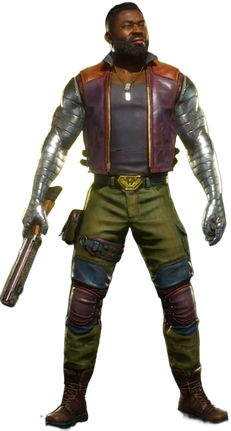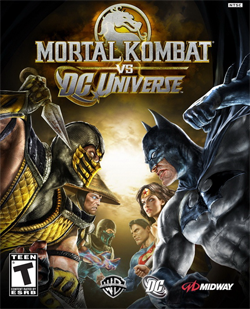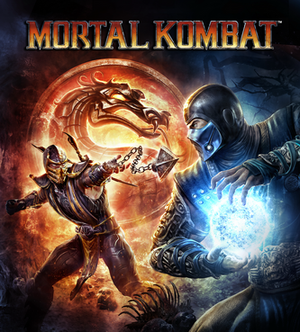
Pokémon Gold Version and Pokémon Silver Version are 1999 role-playing video games developed by Game Freak and published by Nintendo for the Game Boy Color. They are the first installments in the second generation of the Pokémon video game series. They were released in Japan in 1999, Australia and North America in 2000, and Europe in 2001.

Shang Tsung is a fictional character in the Mortal Kombat fighting game franchise by Midway Games and NetherRealm Studios. He debuted as the final boss in the original 1992 game and has remained one of the franchise's primary characters. A powerful sorcerer, he is principally defined by his abilities to shapeshift into other characters and to absorb the souls of defeated warriors. Shang Tsung is usually portrayed as the right-hand man of Outworld emperor Shao Kahn and the archenemy of Shaolin monk Liu Kang. He also appeared in Mortal Kombat: Deadly Alliance (2002), alongside Quan Chi as the eponymous Deadly Alliance, as well as in Mortal Kombat 11: Aftermath (2020) and Mortal Kombat 1 (2023).

Ermac is a character in the Mortal Kombat fighting game franchise by Midway Games and NetherRealm Studios. Debuting as an unlockable character in Ultimate Mortal Kombat 3 (1995), he is an amalgam of the souls of deceased warriors and possesses telekinetic abilities.

This is a list of playable and boss characters from the Mortal Kombat fighting game franchise and the games in which they appear. Created by Ed Boon and John Tobias, the series depicts conflicts between various realms. Most characters fight on behalf of their realm, with the primary heroes defending Earthrealm against conquering villains from Outworld and the Netherrealm. Early installments feature the characters participating in the eponymous Mortal Kombat tournament to decide their realm's fate. In later installments, Earthrealm is often invaded by force.

Jackson "Jax" Briggs is a fictional character in the Mortal Kombat fighting game franchise by Midway Games and NetherRealm Studios. Introduced in Mortal Kombat II (1993) as the leader of a Special Forces unit, he became a mainstay of the series, including as the protagonist of the action-adventure spin-off Mortal Kombat: Special Forces (2000). The character is distinguished by his metal bionic arms, which he first received in Mortal Kombat 3 (1995), and his abilities are based around his upper-body strength.

Kitana is a fictional character in the Mortal Kombat media franchise originally by Midway Games and later by NetherRealm Studios. Debuting in Mortal Kombat II (1993) as a player character and as a royal from the fictional realm of Edenia. She uses steel fans as her primary weapon. In the series, Kitana is aligned with multiple characters, especially Mileena who originally served as her clone, however, as the series evolves, Mileena suddenly becomes the older sister of Kitana and takes her place being the empress of Outworld. Kitana also shares the relationship as the love interest for the series' protagonist Liu Kang.
A season pass is a form of video game monetization in which consumers purchase a discounted package for current and future downloadable content (DLC) and/or Expansion packs for a video game atop its base cost. A game may have a single season pass or, for some lifestyle games, new season passes over time. The name originates from the concept of a season ticket for sports. First introduced around 2011, the use of season passes became commonplace among triple-A and mobile game publishers by the end of the 2010s. Season passes can be controversial because the contents of a season pass are not fully itemized beforehand or may not contain all planned DLC, with some instances of season passes being called scams by the gaming press.

Warner Bros. Games is an American video game publisher based in Burbank, California, and part of the Global Streaming and Interactive Entertainment unit of Warner Bros. Discovery (WBD). The publisher was founded as Warner Bros. Interactive Entertainment on January 14, 2004, under Warner Bros. Entertainment and transferred to its Home Entertainment division when that company was formed in October 2005. Warner Bros. Games manages the wholly owned game development studios TT Games, Rocksteady Studios, NetherRealm Studios, Monolith Productions, WB Games Boston, Avalanche Software, WB Games Montréal and Player First Games, among others.

Mortal Kombat is an American media franchise centered on a series of fighting video games originally developed by Midway Games in 1992.
A debug menu or debug mode is a user interface implemented in a computer program that allows the user to view and/or manipulate the program's internal state for the purpose of debugging. Some games format their debug menu as an in-game location, referred to as a debug room. Debug menus and rooms are used during software development for ease of testing and are usually made inaccessible or otherwise hidden from the end user.

Mortal Kombat vs. DC Universe is a 2008 fighting video game developed and published by Midway Games for the PlayStation 3 and Xbox 360. The game is a crossover between Mortal Kombat and the DC Universe, and is the eighth main installment in the Mortal Kombat franchise. The game was released on November 16, 2008.
Numerous video games were released in 2011. Many awards went to games such as Batman: Arkham City, Portal 2, The Elder Scrolls V: Skyrim, The Legend of Zelda: Skyward Sword, Madden NFL 12, NBA 2K12, WWE '12, WWE All-Stars and Uncharted 3: Drake's Deception. 2011 also marked the worldwide release of the Nintendo 3DS.

Mortal Kombat is a 2011 fighting game developed by NetherRealm Studios and published by Warner Bros. Interactive Entertainment. It is the ninth main installment in the Mortal Kombat series and a soft reboot of the series. The game was released for the PlayStation 3 and Xbox 360 systems in April 2011, and a PlayStation Vita port was released in May 2012. An expanded version of the game, titled Mortal Kombat: Komplete Edition, was released for Xbox 360 and PlayStation 3 in February 2012 and for Microsoft Windows in July 2013.

NetherRealm Studios is an American video game developer based in Chicago and owned by Warner Bros. Games. Led by video game industry veteran and Mortal Kombat co-creator Ed Boon, the studio is in charge of developing the Mortal Kombat and Injustice series of fighting games.

The Mortal Kombat series of fighting games, created by Ed Boon and John Tobias, has been the subject of various controversies since its creation in 1992. In particular, Mortal Kombat has often been criticised from a broad spectrum of politicians and other critics for its unrestrained use of graphic and bloody violence, both in the game's regular combat scenes and its Fatalities—finishing moves which allow the player to kill or otherwise maim the defeated opponents.
The fighting game community, often abbreviated to FGC, is a collective of video gamers who play fighting games such as Street Fighter, Mortal Kombat, Super Smash Bros., Tekken, Soulcalibur, Dead or Alive, Virtua Fighter and many others. The fighting game community started out small in the late 1990s and throughout the 2000s referred to as the grassroots era, but it has grown to a larger scale in the 2010s, with many tournaments being held around the world. This is predominantly due to the rise of esports, online gaming, and digitized viewing habits on live streaming sites such as Twitch.

Mortal Kombat X is a 2015 fighting game developed by NetherRealm Studios and published by Warner Bros. Interactive Entertainment for PlayStation 4, Windows, and Xbox One. Versions for the PlayStation 3 and Xbox 360 were also due to release, but both versions were cancelled. It is the tenth main installment in the Mortal Kombat series and a sequel to Mortal Kombat (2011), taking place 25 years later after the events of its predecessor. High Voltage Software developed the Windows version of the game, with Polish studio QLOC taking over the work on it shortly after the release of Kombat Pack 1.

Cassie Cage is a character in the Mortal Kombat fighting game franchise by NetherRealm Studios. She debuted in Mortal Kombat X (2015) as the daughter of martial arts actor Johnny Cage and Special Forces officer Sonya Blade. Possessing the fighting prowess of her parents, she follows their footsteps by becoming a Special Forces soldier and leading a new generation of warriors in defending Earthrealm. Cassie is featured as the main hero of Mortal Kombat X's story mode and plays a prominent role in her other appearances.















